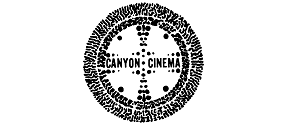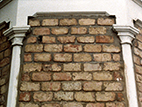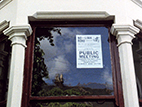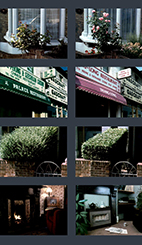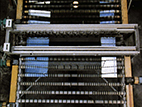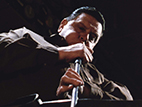Slow Glass
- John Smith |
- 1988-91 |
- 40 minutes |
- COLOR |
- SOUND
Rental Format(s): 16mm film / Digital File
"A mesmerizing experimental documentary that presents a discussion of the manufacture of glass as a way to explore memory and transformation. Filled with Smith's signature witty wordplay and elegant visual punning, Slow Glass also quietly ponders weighter issues of urban transformation and the value placed on craftsmanship." -- Alexander Stewart, notes for screening at Pioneer Works, New York, 2015
"It's a special sensitivity that can extract true visual poetry from pub interiors and charmless London street corners, and something much, much more to integrate this dense web of visual and verbal association around the ostensible theme of glass. Drawing on a panopoly of camera and editing tricks and conjoined with a glazier's nostalgic reveries, Smith expresses a great deal about vision and optics, the changing city, obsolescent craft traditions, and a more elusive sense of loss." -- Jim Supanick, As a Chimney Draws, 2012
"The film begins with a shout in the street and a smashed pane, and ends with a bricked-up window. Between these literal images of opening and closing, Slow Glass spins immaculately shot puns and paradoxes that play on reflection and speculation - words that refer both to acts of seeing and of mind. Glass is the key, as a narrator's running commentary sketches the glassmaker's art, splicing a history lesson with a quasi-autobiography. The authority of word, voice and picture is questioned through the film's gradual revelation of its own (highly pleasurable) artifice. The cutting of glass is matched to the editing of film, and the camera's lens to the surface which it captures. Through the pub-talk and the downing of glasses, other themes emerge; among them is the constancy of change, as the face of London alters and the past becomes present (conveyed in jump-cuts showing streets and shops changing over time and season, and in a gently ironized evocation of a 50's childhood). The flowing Thames echoes the theme of flux, but also underscores the renewed attacks on East London life in the age of the property war - another kind of speculation. Slow Glass suggests that the living past has been turned into capitalized 'Heritage', that the British Documentarists' noble craftsman only survives as a museum piece, and that reality in film is itself a fiction. In this film, the fiction is a crafted illusion that always has a human face." -- A.L. Rees, London Film-Makers' Co-op catalogue, 1993
"There are jokes galore in Slow Glass but the seriousness of it all is what stays with me. There is loss, and frustration, and irony, and irritation, and confinement, and terrible tension in the long glassblowing sequence. The film's visual attack - fast editing, split screen effects and jump-cuts - is heightened because belied by the laconic voice-over. The authority of the voice track, so important to the uninspired documentary film-maker, is thoroughly debunked in this film along with the authority of official cultural histories.
It is obvious from Slow Glass that spoken language has continued to be a preoccupation of Smith's. However, his attention to the problem of the dynamic of the soundtrack, voice track and the image seems to have a different purpose here. This seems to me to be a fundamentally political film for many of the reasons noted before but also because it's telling a story, that most political of acts, relying as it does on subject positions in place. The story is a personal reflection on changing attitudes to labour, and it is also the story of an industry." -- Penny Webb, Agenda magazine, 1992
